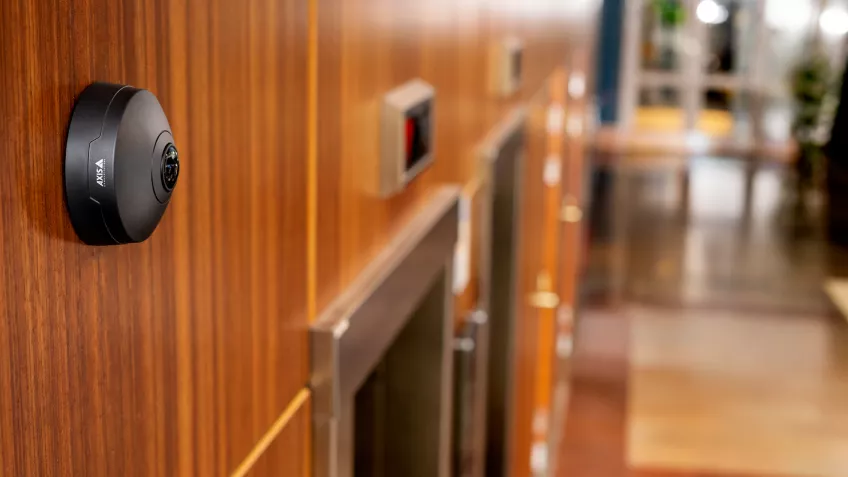
Global businesses, no matter their industry, need to take responsibility for their impact on the world. We are all global citizens and have an opportunity to lead in protecting one another and our planet. In 2007, Axis signed the United Nations Global Compact, and has committed to aligning to the Global Compact’s Ten Principles, while also working towards the UN’s Sustainable Development Goals.
Sustainability is an important and natural part of Axis’ operations. it’s also important to align with broader international initiatives. Therefore, signing the UN Global Compact in 2007 was a natural step for us and continues to be an initiative we support.
The UN Global Compact is the world’s largest corporate sustainability initiative, and has a mission to encourage businesses to:
- Do business responsibly by aligning their strategies and operations with Ten Principles on human rights, labour, environment and anti-corruption
- Take strategic actions to advance broader societal goals, such as the UN Sustainable Development Goals, with an emphasis on collaboration and innovation.
“Since we signed the UN Global Compact, the principles have provided guidance for how we integrate sustainability in our operations. Sustainability is critical for our continued growth and successful development. We want to act as a role model and as a leading market player we have good opportunities to influence those around us, contributing to the UN’s Global Sustainable Development Goals and the UN 2030 Agenda.”, says Axis CEO Ray Mauritsson.
Aligning to the UN Global Compact’s Ten Principles
The principles within the UN Global Compact have become part of the fabric of everyday business life at Axis:
Defending human rights: We know that protecting human rights across the entire Axis value chain is a fundamental imperative. To achieve this we are setting out a comprehensive human rights due diligence framework. Through this framework we have identified key areas of risk and begun preparing a due diligence roadmap to address them. The right to privacy and freedom of expression while using our products is one such focus area, and we strive to ensure that our products and solutions are always used in ethical ways that do not violate an individual’s human rights.
Protecting the environment: We are striving to minimize the environmental impacts from our own operations and products and solutions and have set out clear goals in line with the Science Based Targets Initiative (SBTi). Most of our environmental impacts occur indirectly and are related to manufacturing, transportation of goods and the products’ and solutions’ energy consumption. Over the years we have increasingly taken measures to reduce this impact, for example by phasing out the amount of PVC plastic, BFR (brominated flame retardants) and CFR (chlorinated flame retardants), and polyfluoroalkyl substances (PFAS) in our products. What’s more, we have set a target to increase our use of renewable carbon-based plastic to account for more than 20 percent of all plastic within products launched in 2024, as well continuing to increase the use of recyclable packaging materials.
Humane labor conditions: It is our long-term responsibility to make a positive contribution to society and invest in social initiatives wherever we are doing business, either directly or through our partners. Social responsibility means fostering good working conditions, a safe and secure workplace characterized by equality and diversity, and human rights for employees. This is true in our company’s own operations, while we demand the same commitment from our global suppliers and partners.
No tolerance for corruption: We work closely with our suppliers, distributors, and other partners to manage business relationships in a responsible, transparent, credible, and consistent way. Among the measures put in place, we have a zero-tolerance policy towards all types of bribery and other forms of corruption. We act preventively and systematically to fight this problem in our own operations and throughout our value chain.
Supporting the UN Sustainable Development Goals
The second part of the mission of the UN Global Compact is to support the UN Sustainable Development Goals (SDGs). Few organizations have the opportunity to support all 17 of the SDGs, but at Axis we feel that we have a clear role to play in supporting a significant number.
Let’s look in more detail at some of the initiatives we’ve created or support that align to several of the SDGs.
Supporting SDGs focused on reducing inequality
Goal 10 of the UN SDGs focuses on reducing inequality wherever it may exist, for instance between genders, ethnicity, or through access to education.
We participate in many programs around the globe to help reduce discrimination and foster equal opportunities, and lead by example with policies such as ensuring that every Axis employee with the same level of competence and responsibility is paid the same salary, no matter their gender or ethnicity.
As a technology company, ensuring gender diversity in our company and the broader industry is a key focus. Unbiased recruiting is a high priority. In order to find the right people, we focus on competency-based recruitment. This ensures that we match the individual with the right competencies with the correct job-role, and that any unconscious bias does not enter the recruitment process.
Promoting diversity in the industry

In the USA, we cooperate with the Security Industry Association (SIA) and support its RISE initiative. The purpose is to attract new talent, develop and keep employees, and promote diversity and inclusion throughout the industry. In 2023 we also sponsored SIA and the Society for Industrial Security’s (ASIS) and first ever Security LeadHER conference. By sponsoring events like this, we actively look to spur positive change in the field of diversity.
“Because of our industry leading position, we have a unique opportunity to also drive diversity forward,” says Elaine Palome, Head of Human Resources, Americas, at Axis. “Many published studies show that including people of different ages, cultures, and thought perspectives can lead to innovation, but above all it’s simply the right thing to do.”
Pink Programming
For the past five years we have been among the supporters of the Pink Programming initiative, sponsoring the non-profit organization located in a number of major cities in Sweden and Norway. Pink Programming aims to encourage more women into technology through coding events, which are usually held twice a year and are organized by Axis.
“Getting more women into the IT sector is not just an important question for Axis but for society in general” says Louise Dolck Strömberg, Director HR Operations. “A more uniform gender distribution benefits individuals, companies and society, as well as bringing much needed additional skilled employees into the workplace.”
LGBTQ+ and Gender Equality
We are strong supporters of the LGBTQ+ community and do not tolerate discrimination of any kind. Last year we were pleased to be an official sponsor of Lund Pride (LundaPride) in Sweden for the first time. To coincide with this, Axis ran a series of internal short films regarding Pride featuring members of the LGBTQ+ community. This helped to raise awareness, educate, and inform.
We also introduced gender-neutral paid parental leave programs for the EMEA and Oceania regions. Allowing new parents, regardless of gender, to take paid leave to spend time with their new family members has been an important step in ensuring a more equal and supportive environment for Axis employees during such an important time.
Reducing environmental impact
Reducing the carbon footprint left by humans is a crucial step in the race to reverse climate change and preserve the planet, and a number of the UN SDGs are focused on addressing climate change and creating a sustainable future. In line with these, we are taking steps to design devices that are as energy efficient as possible, as well as improving other areas of our products´ environmental impact and our overall business operations.
In 2022, we also committed to setting science-based emissions reduction targets in line with the Science Based Targets Initiative (SBTi). Science-based targets provide a clearly defined pathway for companies to reduce greenhouse gas (GHG) emissions, thus helping prevent the worst impacts of climate change, and also future-proofing business growth. These targets have since been validated and approved by the SBTi, defining ambitious GHG reduction targets for Axis. We have committed to a 42% reduction in scope 1 and 2 CO₂e emissions by 2030, and a 51.6% reduction in scope 3 CO₂e emissions intensity per sold product by the same year, using figures from 2022 as the baseline. Scope 1 and 2 emissions are those that are essentially created by our own operations, while Scope 3 emissions are those caused by our upstream and downstream value chain.
Analysis shows that 60-80 % of environmental impact from network cameras comes from energy consumption while they are running. As such, we not only focus on making our own products and business more sustainable, we also look at how ways to help lower the carbon footprints of our customers. For instance, we have created a new low power mode function that disables camera heaters when ambient temperatures are high enough, leading to energy savings of as much as 50% in certain temperature ranges.
Promoting good public health and reducing pollution

There’s no debate that public health is affected by the levels of pollution in the atmosphere. According to the World Health Organization (WHO), over four million people die each year as result of exposure to air pollution alone. In the same length of time, eight million new metric tons of plastic are thrown into the ocean, killing wildlife, destroying ecosystems, and entering human bodies through the fish we eat.
We’re supporting the fight against pollution through various initiatives. We have set a goal to ensure that all Axis-designed products launched in 2025 are free from PVC, BFR, and CFR, and that 100 percent of network cameras launched in 2024 will be BFR and CFR free. Approximately 85% of the cameras we launched in 2023 were PVC free.
Product design has been evolving to meet sustainability demands, with a greater number of sustainable materials to choose from than ever before. Bio-based plastics for example, which are those made either fully or partly from biological resources, provide security companies opportunities to adjust their product pipeline for the better. In 2023, 71% of all cameras launched contained recycled and/or bio-based and/or carbon capture-based plastics. We have a goal that 20% of all plastics in our products should be renewable carbon-based plastic by 2024.
We are committed to supporting circularity in product design. This means to reduce the number of unique components, such as screws, while also increasing the lifetime of products. It should be possible to repair products that break, and long-term software support should be provided in order to support a long and cyber-secure use life. Repair, reuse, and recycling are central tenants of future product development.
Finally, our devices run on an open platform, which means that older products are still compatible with new Axis technologies. This allows users to install new software and accessories while maintaining the same device, instead of needing to buy a new model.
Doing business the right way
Goal 16 of the SDGs is about standing up for human rights, and the institutions that support them. Axis has a robust human rights policy that expresses our commitment to respect all internationally recognized human rights and to take measures to address, mitigate, prevent, and remediate actual and potential adverse human rights impact throughout our value chain.
In 2023, we started a project relating to the EU Corporate Sustainability Due Diligence Directive (CSDDD) and the UN Guiding Principles on Business and Human Rights (UNGP), with the aim to set out a comprehensive human rights due diligence framework. One of the first steps was to identify key risk areas across the entire Axis value chain. Having identified eight of such areas, we are now developing our overall human rights due diligence program that will safeguard rights across these focus areas.
We put a lot of effort into fostering a strong code of ethics, not only with our own employees, but with our partners as well. Our Code of Conduct establishes the values and guidelines on which we conduct our business and how our associates should act in business-related situations, internally and externally. Every employee, supplier, distributor and partner is expected to follow the Code of Conduct in order to continue its business relation with Axis. By integrating human rights into dialogue with, and training of, suppliers and business partners we can seek to set a high standard across the value chain.
To further foster ethical business practices we also have an anti-corruption policy in place, with zero tolerance against all types of bribery and other forms of corruption. All employees, including the company board, are required to sign an undertaking that they will comply with the anti-corruption policy and participate in training in these issues every second year.
A continual journey and ongoing commitment
“Axis takes long-term responsibility for how our operations impact our stakeholders and we act according to our values, in an ethical, responsible, and transparent way in our business relationships. Our agenda is long-term and ambitious and there is a genuine commitment to drive the operations in a sustainable way in all parts of our organization,” says Ray Mauritsson, Axis President and CEO.
“The road of sustainability requires commitment and daily efforts. There is still a long way to go, but we are confident that with the help of the whole Axis family – our employees, partners, suppliers, and our end users – we’ll be able to build a smart and safer world for the next generations to live in.”
